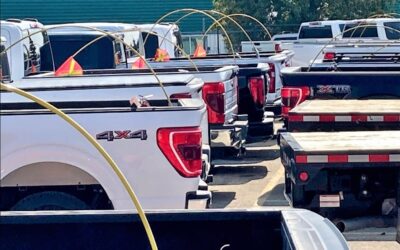2021: Difficult Year for Sourcing New Trucks
2020 has been a difficult year for humans all around the globe. People and businesses have suffered socially, personally, and economically because of fear, loss, risk, and uncertainty posed by Covid-19. The world has witnessed a 180-degree shift in finance and economy globally. Every former event has been a determinant for the ones to follow. Hence, chains of multiple events have brought us to the point we are at right now.
Be it labor or capital intensive, every industry has suffered exponentially and in many ways immediately after the outbreak of the global pandemic. Consequently, from a commoner to establishing a country, each party has had to embrace inevitable change while accepting a new normal.
To minimize risks and counter adverse effects of the uncertainty, governing entities and key industry players have made significant moves and policy changes that have altered the landscape for other industry businesses. Just as any business has its share of highs and miserable lows, the fleet industry, too, had its fallouts. Whereby associated companies became a victim of collateral damage.
One of the biggest challenges for them has been sourcing new trucks. Here is why.
Why 2021 has been a challenging year for sourcing fleet trucks?
1. Order deadlines from vehicle suppliers and the consequences
Earlier this year, industry experts forecasted increased orders in commercial fleets; however, that didn’t turn out to be true. And the reason behind that is a series of announcements made by big fleet suppliers like Nissan, Ford, FCA and General Motors, to name a few, laying strict order deadlines for the fleet vehicle buyers. Industry experts propose the reasons for these unaccommodating order deadlines to be varied. These reasons include a surge of demand from the retail market for the same vehicles demanded by commercial fleets and presenting all-new replacement models and other reasons, off course.
As a result of these stringent order deadlines, all commercial fleets that ordered vehicles after these deadlines would now have to call the 2021 vehicle models instead of 2020 ones. The new orders will have to be placed around or between March and May, as soon as order banks offer buying services; that too is subject to delivery plans later in the year.
The aforementioned situation, resulting from these early deadlines, has debilitated the magnitude of orders for these vehicles during the Spring season according to industry analysts. This is one of the ways how sourcing new fleet trucks got more challenging than ever before.
2. New fleet policy by the new US President
On the 25th of January, President Biden announced a new policy concerning fleet vehicles. He announced that Electric Vehicles (EVs) would replace the whole lot of 645,000 fleet vehicles under the federal government. The government currently has only 3215 electric vehicles. Hence this new policy is no less than a paradigm shift and is a environmentally friendly endeavor that will come with massive investment by the government, which early estimates have up to $20 billion. At least to say, the president’s vision is worthy of appreciation.
However, there is more to the policy. President Biden also said that he wanted to procure EVs assembled in the US by native workers who are also part of unions. But here’s where the problems in the plan start to arise. There are specific regulations upon federal procurement, so several EV manufacturers would become ineligible to buy from. One of these regulations considers only those vehicles as US-made, with at least half of their components manufactured in the US. In the same fashion, the largest EV manufacturer by volume is Tesla, but their workers are not union members.
Hence, many potential manufacturers would remain ineligible, and the federal government won’t have many options unless they allow some exemptions.
Federal Policies in the past
If you have been a follower of state affairs, you’d know that the US government has sought to alter the federal vehicle fleet’s structure in the past, to stop burning fossil fuels and reducing air pollutants. Likewise, under President George Bush’s leadership, the Energy Policy Act, also known as EPACT, was signed in 1992. The purpose of EPACT was to make the federal government shift from vehicles that run on fossil fuels to enhance US energy independence by cutting down on imported crude oil consumption.
The law further mandated that the US government get their hands on at least 5,000 substitute vehicles that wouldn’t run on fossil fuels. This number was to increase each year so that by FY 1999, the federal government would have 3/4th of all fleet vehicles converted to substitutes.
Although EPACT is still an active law, the US department of energy failed to adhere to its procurement law in 1992. The same can be predicted for current times. Hence, this shift from traditional fleet vehicles to an emissions-free fleet is yet to be witnessed.
Other parties moving in the same direction
Apart from the US federal government, General Motors has publicly declared that they’ll be manufacturing battery electric EVs and fuel cell vehicles so that all vehicles they produce are emission-free by 2035.
Along the same lines as the US federal government’s, the Commonwealth of Massachusetts is now emphasizing deploying the same EV sale mandates, requiring all other vehicles sold in Massachusetts to be EVs by 2035.
Bird’s Eye View
As a result of drastic changes in government policies and big moves made by top manufacturers, the fleet industry’s dynamics have become critical. The acquisition of fleet vehicles has become unprecedentedly competitive due to uproar in demand by governments as well as retail markets. The sourcing of new trucks for fleet businesses is a challenge yet to be overcome. Which is why renting out fleet services seems to be the best option moving forward for organizations and institutions alike.
Contact us today for more information on renting trucks for your fleet – we have the inventory!
Source:
https://www.automotive-fleet.com/10135887/state-of-the-fleet-industry-lost-fleet-spring-order-volumes-new-electric-vehicle






